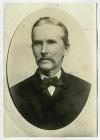A BRAVE young poet born in days of Eld,
Dwelt 'mid the frozen Northlands; he beheld,
And wondering, sung the marvels of the ice,
The swirl of snow-flakes, and the quaint device
Wrought on the fir-trees by the glittering sleet;
And loved on stormy heights, cloud-girt, to greet
The gray ger-falcon towering o'er the sea;
To watch the waves, and mark the cloud-drifts flee,
Big with the wrath of tempests; yet his heart
Soft as the inner rose-leaves of the spring,
Rich with young life, and love's sweet blossoming,
Too soon, alas! from life and love did part:
Veiled was the fate that smote him; unaware
What sudden, blasting doom had drawn so near,
A strange blight breathed upon him, and he died!
On earth to die, in heaven be glorified,
Such was the Minstrel's portion; still he went
Through all the heavenly courts in discontent
And sombre grief, the pathos of his woe
Rising at times to such wild overflow
As forced its wailful utterance into song.
That passionate rash of music, the heart's wrong
Set to the sweetness of harmonious chords,
The All-Father, Odin, o'er the clash of swords,
And din of heroes feasting at the boards
Of loud Valhalla, heard: thereon he sought
This lonely soul, in highest heaven o'erfraught
With mortal memories. "Wherefor lift'st thou here,"
The All-Father asked, "these measures of despair?"
"Because my mortal Love," the poet said,
"With time grows gray and wrinkled; on her head,
So golden bright in youth's benignant prime,
Chill frosts of age have left their hoary rime;
Her eyes are dimmed, her soft checks' rosy red
Hath with the flowers of many a springtime fled;
And so when Heaven shall claim her--ah! the pain!--
I shall not know mine earthly love again!"
To whom the God, "But doth she love, thee still?"
"Her love, like mine, nor years, nor change can kill,"
The Minstrel answered: "Faith, a ceaseless shower,
Keeps fair and bright our love's immaculate flower."
"I loose thy heavenly bonds, I bid thee go!"
The All-Father cried, "and seek thy Love below!"
To earth he came: drear waste and flowery lea
Beheld his search 'mid fettered folk and free;
Yet all his tolls but brought the direful stress
Of lone heart-yearning, grief and weariness,
Till hope died out and all his soul was dark.
At last, when aimless as an autumn leaf
Borne on November's idle winds afar,
He roamed a sea-beach wild, by moon or star
Unlighted in its dreariest hour of grief
And desolate longing, on his eyes a spark
Of tiny radiance through the clouded night
Flashed from a cottage window on a height,
Next the dim billows of the moaning main.
There broke a sudden lightning on his brain
Of prescient expectation,--then, before
Its glow could fade, he trod the cottage floor,
And saw in tattered raiment, wan and dead,
An ancient withered woman on a bed,
Of whom a crone, as shrunk almost as she,
Said with drawn lips and blinking wearily
"Lo! here thine old Love! Hast thou come so far
To find how cares may blight us, death may mar?"
As ebbs a flood-tide, so his eager breath
Sank slowly. "Oh, the awful front of death!"
He moaned. "Yet wherefore shudder? Thou, my love,
Art precious still; nor shalt thou move above,
An alien soul, albeit no longer fleet,
Nor fair, thou roam'st through Heaven with tottering feet,
Bent, aged form, and face bedimmed by tears;
I only ask to know thee, while the years
Eternal roll!"
He bids a last farewell
To this world's life, again prepared to dwell
On heights celestial, in whose golden airs
The heart, at least, shall shed earth's wintry cares,
And blooming, breathe the vernal heats of Heaven.
Twice ransomed soul! thou spirit that hast striven
With countless ills, and conquered all thy foes,
Rise with the might of morning, the repose
Of moonlit night, and entering Heaven once more--
Behold! who first doth meet thee by the door,
With smiling brow, and gently parted lips,
And eyes wherein no vestige of eclipse
From pain, or death, or any evil thing,
Lies darkly, but whose passionate triumphing,
In peace attained, and true love crowned at last,
Hath such rare joy and sweetness round her cast,
She seems an angel on the heights of bliss.
And yet a mortal maid 'twere heaven to kiss!
To whom the singer, in a voice that seems
Vague, and half-muffled in the mist of dreams:--
"Art thou the little Frida that I knew
So long--ah! long ago? Thine eyes are blue,
Deep blue like hers, and brimmed with tender dew,
Through which love's starlight smiles--art thou, in sooth,
The sweet, true-hearted Frida of my youth?"
She drew more closely to the poet's side,
And nestling her small hand in his, replied,
As half in tremulous wonder, half delight:--
"I am thy little Frida, in thy sight
Fair once, and well beloved--Ah me! ah me!
Hast thou forgotten?" "Nay; but whose" (quoth he,)
"Yon withered corse, on which I gazed below,
With pale shrunk limbs, and furrowed face of woe?
Thy corse, thy face, they told me!"
"Yea, but know,
O Love! that earth, and things of earth, are past:
That here, where, soul to soul, we meet at last,
The merciful gods have made this wise decree:--
Love, in heaven's tongue, means immortality
Of youth and joy; then, wheresoe'er we go,
Loving and loved through these high courts divine,
Mine eyes eternal youth shall drink from thine;
And thou forevermore shalt find in me
The tender maid who walked the world with thee,
Thy little Frida, loved so long ago!"






